Episode transcript
Opening Titles.
Narrator: By 1974, Jay Hammond had put in 12 years as a state representative, senator, and senate president. He was mayor of the Bristol Bay Borough, where he flew and ran a guiding business on the side. Despite his ambivalence about being a politician, Hammond went on to be a two-term governor who oversaw the creation of the Alaska Permanent Fund, the dividend program and, to his chagrin, the repeal of the personal income tax.
Intertitle: 1974 – “Conned” into Running for Governor
Jay Hammond: When I ran the first time, I said I’m not spending a nickel of my own money, this is ridiculous not a chance of winning. And as you may or may not know I was conned into running because of a call from Ron Somerville. …
Ron Somerville was a biologist, Fish and Game Department. I didn’t know Ron very well, but I was weathered in down in Naknek with one of my clients fisherman. And I got this phone call and picked it up and Ron Somerville. He said a few of us sitting around think you ought to run for governor. By the time I stopped laughing I said to him Ron, I’m not at all interested in bleeding myself white financially for the privilege of saying I ran unsuccessfully for governor. Forget it. And he said and he got to talking further and he said well would you consider it if we put together a campaign organization and came up with some funding? I said well that’s the only way I’d ever consider it. He hung up.
I had a fisherman from California, very wealthy guy there. He said hey if you run you got a thousand-dollar check in the mail right now. I said forget it. That’s a check you’ll never have to write. Two weeks later Ron called me up and he said okay, we got an organization put together. We got some funds committed and you said – wait a minute. In his mind again consideration translated into commitment. And I argued against I said I never said I’d run if you’d do that. He said well will you come in and at least talk to us in town here.
So the next time I flew into town I met with my campaign organization, all six of them. I don’t even remember who they were. I think Av Gross, Ron, maybe Terry Gardiner, Clem Tillion, about six people. And I could tell that all of them had been told by Ron that I would run if they’d do these things. And again being a sucker and not having guts enough to say, hey, I never promised and turning my back on it, I knew they’d all leave there thinking I had broken a commitment. So when I found what we had in the bank committed in the way of funds at that moment $800 I agreed to run. Thinking well I’ll run for a week and I’d go back to the hills where I belong.
And now they had said they would commit more money if I’d agree, but at that time I think it was $800 that was all that was in the kitty. And so I don’t remember what I did. I remember one thing I didn’t mind doing campaigning was going around beating on doors. Give me some exercise and I’ve always been kind of a physical fitness buff and that I didn’t mind doing.
But I had the briefest campaign pitch you can imagine. I’d go to the door, had a little flyer. I’d say hello I’m Jay Hammond I’m running for governor and I wonder if I could leave you this. That’s it. Usually they’d nod and say yes and I left on a positive note.
But where I thought – and I had no idea of winning this thing. This is ridiculous and the response of people when I’d go around the community. Who is this bearded yahoo that has the audacity to run against Wally Hickel and Bill Egan and then Terry Miller and so forth
I was running against Hickel, Egan, and then Miller, all three of the governors and I had no business winning. I had no fear of winning. I frankly had no aspirations to win to be quite frank. I had a good life on the outside of politics and I recognized that whoever was governor in the coming years was going to be confronted with several major very divisive issues, but I was happy to have the opportunity to sound off on what I thought were key and important issues and since I didn’t really care whether I won I could say anything I wanted to and I very much liked that. And oddly enough as old Jay Kerttula, who was a consummate politician who understands these things much better than I, he assumed somehow that I’m the most brilliant political mind he’d ever encounters said, “Hammond you do things that should be politically suicidal and they seem to turn around and accrue to your benefit.” He was convinced that I carefully orchestrated and calculated what this move — if he had any idea of what dumb luck went into everything I did. Nothing I planned to do in politics worked out.
But they were indulgent. Then it started to change. When Hickel and Atwood and Carr came up bombing me. I had more people tell me I don’t know anything about you but anybody that has got all those guys against him can’t be all bad. So I subsequently thanked them later when I became more comfortable with this for playing the key role in my election. But it was – you could sense the change. You could just feel it shifting. And I walked into a store one day and a guy looked up and he said, hey, you got my vote. I saw you on television. Let me tell you any guy that has got guts enough to wear a beard and run for governor has got to be different. Unlike these other guys who are clean shaven and try to convey the impression of honesty and integrity and we know they’re crooks.
Anyhow I sensed the change and I knew I was going to win the primary.
Bill Egan was a warm avuncular figure who of course endeared himself to Alaskans by his recall of names as much as anything. And being the total opposite I stood in awe of his capabilities cause I forget names and faces, the whole smash. You probably have heard my story about during the campaign a fellow came up to me and stuck out his hand and he said, hi, Jay, how are you? No, he said, hi Jay and then noticed my blank look of non-recognition. And he says you don’t remember my name do you? I said the heck I don’t I just can’t place your face. I’m sure Egan got another vote, but I was terrible at it, terrible at it. And he was superb. I had many people say I don’t know anything about Bill Egan but he never forgets my name. But Bill had enormous concern and passion for serving the state and did a magnificent job of it and warrants a huge niche in the history of Alaska.
And I had great admiration for Bill Egan and certainly I told him one time, oh my, one time in Fairbanks. I got cross (inaudible) with Bill on more than one occasion. One occasion happened to be when he had made a comment to the effect that Hammond professes to be a conservationist. Why look at here he voted against my bill to create a Department of Environmental Conservation. The reason I had done so it was an absolute toothless tiger. It didn’t do anything. I wanted something with a great deal more capability and force and prominence than what he had proposed. So I countered it by saying this is when we were running for governor – countered it by saying well Bill Egan assertion that I oppose his conservation department because I was really not an ardent conservationist would be as ludicrous as me saying that Bill Egan was opposed to higher education because he vetoed a portion of the budget destined to the University of Alaska. And oh I knew what the response would be, he was outraged, saying Hammond that I (inaudible).
We were scheduled to meet in Fairbanks at a PTA or some gathering, there were hundreds of people there. And I knew exactly what Bill would do. He came armed to the teeth and prepared to really work me over. Do you remember this? So anyhow I got to speak first. He was going to be cleanup. And he’s sitting there just kind of glowering at me and I started off. The audience knowing there is going to be firestorm between us. So I started off by saying well you know I want to tell you of the enormous regard and respect I have for Governor Bill Egan. And if I have to be defeated by anybody, there is no one that I’d prefer to be and I outlined some of the things he had done for the state. I could see the audience visually warming up. This isn’t going to be a firestorm after all. And I kept plumping his cushions and saying all these kindly things about him and then I finally walked over to him, so all I can say Governor I want to wish you luck but not too much. So I sat – he got up and of course Bill had this prepared speech in hand. Got up and started reading this thing, lambasting me, excoriated. The audience is sitting there aghast, how can this guy respond like that to this kindly – I bet he didn’t get a vote other than his own.
That’s the sort of thing that makes campaigning fun and I love it when that opportunity presents itself.
These guys — Wally was a wonderful, wonderful opponent because he took himself so seriously. And of course viewed me as an irreverent clown of course and which I’m sure a lot of folk did. But most of us take us too seriously and pose tempting targets because there is nothing I prefer to do then prick pomposity’s including my own and they are in abundant array as you know out there on the political horizon.
Oh, one time I was at a press conference that asked all the governors about their qualifications and desires for running for governor. I was a tail end Charlie. And they go through – Wally Hickel, why he thought he was most qualified to be governor and he outlined the fact that he had been governor and Secretary of the Interior, successful businessman. And Tom Fink when through his drill. And I think Chancey Croft and Jay – there was a little black guy who was running, and I was the last guy. And they said why do you think you’re most qualified? And I don’t think for a moment I’m the most qualified Alaskan to be governor. I’m sure there’s a multitude out there more qualified than I. Isn’t it a shame none of them are running? Oh they had Wally and Ernalee on camera and he’s listening indulgently until that moment and they both just clapped.
Then another time they asked the same question in another so-called press conference and it was why do you think you’re most qualified to administer the state? Here Governor Hickel has had enormous administrative capability or experience and all the rest of these people and you’ve run a little flying and guiding business and so forth. And I said yes, but I have an unfair advantage over those other fellows. Well what in the world is that? I said well the prime hallmark of run- of an administrator is capability of selecting persons of greater competence than themselves to fill positions of authority beneath him. And I have a much broader range to choose from than do those other – and you know it proved true in a way because they were kind of high bound to play to the partisan. I could pick anybody I wanted to. I wasn’t dependent on the Republicans for election. It was in spite of the Republicans that I was elected. It was dissident Democrats and the so-called, what do they call the young turks and a whole bunch of kind of oddballs that put me into office and the public apprehension over what was coming up. So I did have that advantage. I didn’t have to cater to anybody.
Intertitle: Governor Jay Hammond, 1974-1982
Jay Hammond: I really didn’t want to win. And I have to confess election night was one of the most miserable nights of my life. It felt like prison doors were clanging shut behind me. And I had – I felt like a monstrous fraud because here my campaign people who were working so hard on my behalf, I’d surge ahead a little bit and I’d have to show elation when I ah no. Then I’d fall behind and I’d feel better about it, not a chance of winning and they’d be of course down in the dumps and I was just the opposite.
Then I won just barely.
I could never win under today’s circumstances. People ask me what you spent on your campaign. What I contributed my own campaign. Nothing. I contributed a thousand dollars for one campaign and recouped it when I got – from return – I’m a little embarrassed and ashamed some of these people say well you knew what your campaign was worth. You weren’t willing to contribute but still – you have probably heard this story about I went to a fundraiser or allegedly a fundraiser. I was sent to one and I was supposed to ask people for money. I said ah, the last thing in the world I could do is ask people for money. I’d rather wrestle naked on the courthouse lawn at high noon than ask anybody for money. And some guy in the audience says Hammond I wouldn’t give you a nickel to your campaign but I’ll pay fifty bucks for a ringside seat at the courthouse. Well I never found any worthy or willing opponent so fortunately I never had to fulfill that commitment.
It was a certain point in history that the only time that I could have snuck in. A few years before – what had happened it was in the wake of Watergate. People were really turned off on traditional politicians for one thing. They were very apprehensive about what the pipeline was going to do and the Native land claims were going to do. There was a lot more environmental concern than ever had been evidenced up here and I of course again suggested we should buy back the Kachemak Bay leases because there was in improper process in my view of public input and so forth. And of course that was terribly controversial and when I bought them back I was dammed roundly as the prince of darkness by many folk, but have you ever heard a subsequent candidate say if elected I shall reissue leases in Kachemak bay – no. And even Don Young and Stevens and company ardently supported to buy back in Bristol Bay at one time. Now that’s kind of quiet but – so things have changed.
But I’m always out of cycle.
And there I am and I’ll tell you I heard those prison doors clang. I was miserable the first two years. I hated it. I hated it. And worked like a dog. Kind of like Jimmy Carter. I tried to keep on top of everything and I burned the midnight oil, never took any time off. Worked weekends and Sundays and I hated it. And of course those first four years were tough. …
And I remember feeling – my first year or two in office I was a lousy governor. Lot of folk would say a lot more than that, but I felt sorry for myself and I was miserable in that job. To have to wear a necktie and go to the office every day and I had a very freewheeling lifestyle prior to that. And I knew what we were going to be confronted with, terrible controversy and certainly were. But the main thing was it was debilitating to – if you have the fire in the belly, the desire for the prominence and prestige and power and so forth, that’s one thing, but I didn’t have any of these things going for me, nothing that meant much to me. As a consequence taking all that guff and grief that went with it were pretty hard to do. But mainly because I felt sorry for myself – despicable. I had little respect, self-respect in life until I read an article – I felt like a monstrous fraud, perpetrated on the people of the state. And I remember reading something from one of the old philosophers, Aristotle or somebody, that said only he deserves to lead who just as soon would not. I thought well maybe it’s not a cardinal sin not to have that fire in the belly and not to aspire to the prominence, prestige, and power that go along with the trappings of office. And things started to get better. Then I – things started shaping up and shaking down and I got some awfully good people that I could turn most of the chores over with and was at least wise enough to go by their counsel and select people who could all do their thing better I could have ever done it.
And I was being castigated for having appointed Democrats – Ab Gross and two or three others to my – or some others to my administration. And I said well I wanted …
Diversity into my cabinet and so I calculated these – selected some developers and conservationists and developers and conservationists, Democrats and Republicans and I brought both of the latter here with me. I only had two Republicans in my entire cabinet. Rest of them were either Independents or Democrats. …
I had some wonderful people working for me and they became like family. One of the reasons – I had not intended to run for more than one term. I almost announced I was only going to run for one term and even my wife said, nah, don’t do that because you never know. You may change your mind. And had I gone out in ’78 I would have gone out with a whimper. The permanent fund wasn’t shaped up right, no dividend program.
But I’m glad I did now. I tell you had I gone out in that first year, gone with a whimper. I had a 43% approval rating is all. Didn’t have a high disapproval rating, but I don’t know if you’re familiar with what happened during the interim so far as approval ratings. David Sawyer, is that name familiar to you – internationally famous pollster. He come up and he done a poll during the ’78 election. He said he came up with 43%, I had something like a 9 or 18% disapproval. He said your disapproval isn’t high, but your approval – you can win but it is going to be tough.
And anyhow we won it as you know and then he came back four years later to do a poll for Terry Miller, who was contemplating running. Same questions asked. He came into my office and he said I’ve never seen anything like it. I’ve never seen anything like it in all my years of experience. You went from 43% approval rating to 82% in four years time. He said it almost doubled – your approval and I was doing the same things, saying the same things, but I was saying it directly. Bob Clark got me on television. It was the first – we’re going to have you saying it in everybody’s living room directly so they hear it from you rather than the Anchorage Times likes to translate it and so forth. And I was doing the same thing, saying the same things, but the people were understanding it and apparently far less disapproving.
So I’m glad I stuck around for the second four years. And it became kind of fun, twisting the legislative tail and you can move and shake you know. They talk about lame duck being emasculated, you can move and shake in that second term so much better and without the distortions of what you’re up to that are now incumbent upon those who want to run against you, the newspapers may be against you, why bother? They can afford to look at what you’re really up to and why, they don’t have to put their own spin on it to make you look bad you’re not going to be there anyhow. That’s where the big difference is and I started to enjoy the second term and maybe when you start enjoying it, it is the proper time to get out.
Intertitle: Creating the Permanent Fund
Jay Hammond: When I was campaigning for governor I tried to promote the idea of Alaska, Inc., which was a shareholder owned investment account and spun off dividends. Every Alaskan would receive a share – I wanted to actually issue shares of stock and each year you’d accumulate another share and you would earn more dividends. And when I became governor I formed what I called the Alaska Public Forum, primarily to showcase that throughout the state. And I went throughout the State arguing in behalf of that approach and the public response was a massive yawn. There was no interest in there at all. Crackpot idea, crazy.
Just got a letter from my ex-deputy commissioner who sent me an article from the Wall Street Journal advocating exactly what I was talking about earlier. We put all the money into investment account. It spins off only dividends. Man I wish that gentleman who wrote is a Nobel prize winning economist was around back in those days. It would have had a little more credibility in the concept.
Anyhow I got nowhere with it, but this fellow in my administration said when you proposed that I thought it was kind of whimsical, quaint, and so forth, but wow, see what involved into. That was one of the things I had hoped to do when I first got into office and I introduced Alaska, Inc., which was a bill that did precisely that. And it didn’t put all the money. It recommended as I say three times as much as and dividend appended to it.
Well there were a few people in the legislature that saw the wisdom of taking some of the money off the legislature smorgasbord and put it into an investment account. And among them primarily were people like Oral Freeman and of course Hugh Malone and Clark Gruening, and Terry Gardner and a number of people in the legislature, Chancey Croft. And they discarded the name Alaska, Inc. And put out their own bill, which they called the Alaska Permanent Fund, had no dividend appended to it.
And I remember Johnny Sackett came up to my office. He was not favorable disposed at that time to the whole concept I don’t believe, as many politicians are not because if they don’t have the money to spend they have to extract it back in some form or cut budgets. So naturally it is not very popular with those in the legislature. But he came up and he kind of growled in my ear and he said that’s nothing more than that permanent fund – that’s nothing more than your damn Alaska, Inc. I said on the contrary John it is nowhere near Alaska, Inc. It has no dividend and it by no means permanent in my view because statutorily constructed fund will be invaded the minute they need money. It has to go in the constitution.
So then we wrote a bill that put it in the constitution requiring a vote of the people before they could touch a nickel. But I thought about trying to put dividends in the constitution, but I was biting off much too much. I knew it would never fly with that….
Anyhow it did go on the ballot. The people to their great credit voted it in.
As far as financial, just funding anything was a real, real problem. As it was when I first went into office a lot of people don’t realize that in my first four years in office we spent less money than Bill Sheffield’s first term all together my first five years in office. Now of course we had the money and in my last years of office we spent much, too much and the only reason why I didn’t veto more than I did out of some of the legislative proposals, which one year incidentally came – if all the legislation that had been introduced passed came according to Chuck Cleshoal. He was my walking computer, 18 billion dollars worth of appropriations. Now mercifully most never saw the light of day but of those which passed I vetoed a billion six million, which again according to Cleshoal is more than any probably all the other governors combined. And we still spent too much. Why – because we couldn’t put as much as I would have liked to put into the permanent fund. In order to get any permanent fund we had to let them spend some, save some, and invest some.
Intertitle: Impermanent Dividends
Jay Hammond: I had pondered how to distribute benefits from the earnings of the permanent fund. And I thought what is it everybody needs, everybody has to have food, shelter, power generation, probably gasoline and so forth. Maybe we ought to parcel these dollars out in some form of health insurance or some universally required service. But then I thought wait a minute you know your needs are different than his, than hers, and so forth. The easiest way to do it is just give everybody the wherewithal to select for themselves how to do it.
What I think — we had another incidence of a dividend program that many people forgot about. The permanent fund dividend program was not the first one. …
It related to gas, a gas tax. We had a severance tax on gas that I think was half the national average on natural gas. And there were suggestions that the gas tax be raised to at least the national average because while some of the gas was being utilized here in Alaska, most of it went to Asia as I recall at that time. Why was the severance tax kept so low? It was to accommodate the prime users here in Anchorage. And when I suggested we double the gas price, the Anchorage legislators came out of the woodwork to say that is outrageous. We can’t support that it would affect our constituents.
What it would do according to the records was raise the average gas consuming family in Anchorage by $19. That was all. And in order to prevent that from impacting them, we were subsidizing in essence the Japanese as well.
So I drew up something that I called, it was kind of an offer they couldn’t refuse. …
I said okay if you vote this tax in we’ll give you 100 percent residential property tax exemption. They had voted to tax it. Okay, so I thought well wait a minute why don’t we do this. Why don’t we raise the gas tax up to the national average, which I think was double, we will then give everybody in the state, not just the Anchorage gas user. Why shouldn’t the people in Fairbanks or Ketchikan, Juneau, Barrow get the same sort of benefit. We’ll give everybody a $150 credit against their income tax.
Now what happened is we raised the gas tax. We got seven million more dollars in revenue. Five million went out in the $150 credit. I found almost nobody ever heard of it. Had they received $150 check in the mail, yeah, what’s this for? They would have paid some attention.
That’s when I became determined rather than giving credits and all these types of things other than the direct distribution of cash is the way to go. So I abandoned the whole thought of health insurance or power deals, but that was our first – that was our very first dividend check. And that occurred, gosh I don’t remember, long before the permanent fund was created.
But I did see a potential for doing something that I failed to do in Bristol Bay and that is creating a stockholder owned if you will investment account that spun off dividends using as the basis our resource wealth that in my view belongs to the people.
And I tried to do it in Bristol Bay, was successful in establishing quote what you might call a permanent fund but they didn’t append the dividend program to it. And as a consequence as I fear will happen to the State if they somehow damage the dividend program, which is the major protector against invasion and dissolution of that fund, it went out the window. They ultimately spent their $12 million permanent fund on a swimming pool in Bristol Bay or Naknek and now they’re broke. They have 41 homes for sale and people are fleeing like rats from a sinking ship in many instances.
And the State I fear will experience exactly the same thing where a successful in requiring the vote of the people before they can expend any of the corpus of the fund. But whose going to care if there is no dividend that is impacted one way or the other by what they do and the question arises, all right now we need a billion dollars to balance the books. Shall we take it from that $27, $28 billion dollar permanent fund or impose an income tax? You know what the people will say, of course not. So there has to be some means of stopping that.
Then we have to fight to get the dividend. And the dividend that first went into place unfortunately where I made my mistake was to presume that why shouldn’t the old-timers that have owned “those resources” since statehood in ’59 get one share of stock for each year their residency just like the new timers will get them for their share of ownership. That’s where it fell down. A couple of new comers came up here and concluded that they would not get as much as the old-timers would initially. Although in the long term ironically in the long term the old-timer for example we arbitrarily set the value of the dividend at $50. So 21 years before that bill went into affect would have accrued $1,150 to every old-timer the first year whereas the new comer would only get 50 bucks. Outrageously discriminatory was their conclusion.
Anyhow they failed in the State Supreme Court that supported our position and Justice Rabinowitz at the time said have you gone prospectively, you should share as a thought earning dividends into the future rather than in retrospectively. No problem. That subsequently was repeated by other attorneys as recently as a couple of months ago.
But there are other ways of doing clearly, clearly legally. I think I mentioned before what we could do and what we should do we announce this year this is the last time for the foreseeable future anybody can qualify for the permanent fund dividend. Let’s call it dividend A. Open the door everybody has to have the chance to come in and qualify. Then we close the door after next year and we don’t know when we’re going to issue dividend B. It may be when the permanent fund grows by a certain percentage. But it does so, and then we divide the number of people, Dividend A recipients, and the new comers into the overage, that 10 percent or whatever increase in the permanent fund’s market value, and that is dividend B. Old-timers get dividend A and B. New timers only B and so far into the future. You do that you have eliminated the magnetic attraction of many people think have lured a bunch of freeloaders up here. And embarked on a program that I think gets back to my original intent I hear people say well original intent of permanent funds rainy day account. Bull feathers. That word was never even mentioned back then to my knowledge. Why would we call it permanent fund? The CBR is what the rainy day account is. And look how it’s being treated. You’re obliged by law theoretically to repay any moneys loaned from the permanent fund. Since no dividend appends to it, who cares. Nobody pays any attention. It is going down and down and down, but if your dividend went down at the same time the way those people spent that money, the public would rise up in outrage. That’s why you have to have a dividend program to protect the permanent fund.
We did get something and we did get a dividend program but then it got what I call zovolized which totally distorted and abused it in — to the degree where I even thought about after the Supreme Court decision, I very briefly thought about vetoing the bill. But then I concluded it was far better than nothing and – but I refused to sign the – I’m the only governor that has never signed their permanent fund dividend check. I don’t know if you know that. I had my commissioner of administration sign them.
… I didn’t sign them. I was that disgusted in the manner in which it went.
According to the World Bank, every other state and nation, except Alaska, has made mistakes in handling their oil wealth. We have done the best job because of the dividend program largely.
And as Vernon Smith, economist, says it should be an example for the world to emulate and Alaskans ought to be extremely proud of it because it is a whole new concept of people owning the resources and government having to take the money back from the people instead of government getting the money and parceling it out in socialistic programs. It is exactly the opposite of what some people term the dividend be socialistic, it’s capitalistic in extreme. And of all people who want to be supporting it are the so-called conservative Republicans. Ironically, who do I find most supportive are the Democrats. These so-called tax and spend. It’s all screwed up in people’s minds.
Intertitle: 1979 – The Income Tax Repeal
Jay Hammond: When it was proposed that the income tax be repealed, the legislature of course was almost unanimously aboard. I think only one other person than Clem Tillion. Clem Tillion opposed repeal, somebody else, who neither Clem nor I could remember who it was. But I remember arguing before the Chambers of Commerce at both in Anchorage and Fairbanks. I said you people condemn us for living beyond our means. Now how do you correct that? You either reduce your living or you increase your means. You repeal the income tax you’ll do just the opposite. You’ll not only reduce your means, but you’ll cut the major constraint on spending. You’ll severe the connection between the public’s purse and the politicians. And spending will soar into the stratosphere.
Oh, no, and somebody came to me – so we – I said suspend it, reduce it, but don’t eliminate it. So Michael Coletta, Clem Tillion, and I conjured up a bill that would have in essence suspended it in this manner. It said the first year you pay three-thirds of your income tax. The next year two-thirds, the next year one-third, and then it is suspended for you. So newcomers, pipeline transient workers, so forth would pay the full rate but then it would gradually decline. And some news reporter came to me and said well what will you do if the court strikes that down? Will you permit the income tax to become law? And I had said at the time repeatedly I thought repeal of income tax was downright stupid. Well it wasn’t a very popular (inaudible) as you may recall.
And I said suspend it, reduce it, but don’t take it off the books. Your spending will soar into the stratosphere. Anyhow they said well will you permit it to become law if it – your bill is struck down? I had no idea the court would strike ours down. I still don’t understand the rationale for it. Maybe if we’d had a simple suspension instead of this one, two, three, and out. But anyhow they did strike it down.
Well now mind you there was a petition overwhelmingly subscribed to by thousands of Alaskans to repeal the income tax. Legislature was all but two wanted to do so. And they asked me are you going to veto it now? And I said well, you know I’d like to but on the other hand nobody would delight more than jabbing that veto down my throat than the legislature and I’d probably be recalled by the public salivating over repeal of the income tax. And then they said – people said well now you said you’d let it become law if – well I didn’t really say that. I said I might as well because these other things would occur. Again I didn’t have guts enough to veto it anyhow, which I should have done. I’d probably never have served another four years, but I would have slept better. But I think many people recognized – well, most – probably most Alaskans now think it was a good idea to repeal the income tax. Terrible idea. We wouldn’t have the fiscal gap. We wouldn’t have spent anywhere near the amounts of money we had and no Alaskan would be paying any more than what he is getting in the dividend or almost none of it.
But the fat cats quite frankly who of course would pay a lot more unless that income tax were capped were delighted to see a repeal of it and will fight to the death to keep it off the books if possible. And in the process you know they would take from the destitute working welfare mother, they’d take their dividend check before they would pay a nickel in income tax. And brother it ain’t right. Anything I can do to avoid it and I think there area a lot of people are starting to recognize that. Again, it doesn’t mean that we’re going to bleed the fat cats white. If you put a cap on it, they’re not losing anything more than their dividends. They got no complaint.
Well you know I find it a little ironic that those prime advocates of income tax repeal frequently are those most opposed to the dividend program asserting that it lures freeloaders up here and so forth. My heavens the freeloading we get because of repeal of the income tax outweighs the freeloading you get from dividends tenfold; 87-½ percent of our oil revenue goes out in what I call dove — government dividends, hidden dividends, hidden dividends that affect you differently than he, than she, than him. And I never hear them complaining about that being an attraction that brings folk up here. To me the best way to remedy that sort of thing not to take from the one program that equitably distributes our oil benefits to shift money from it as some of these people would do with the type of endowment they would have to ship money from the equitably distributed program into the inequitably distributed programs that affect different people differenly. We should do exactly the opposite as Vernon Smith suggested. Cremo suggested. I suggested. Tillion and Halford. Take the money out of the pot the legislature can spend – we should put the 87-½ percent into the permanent fund and the 12-½ percent instead of vice a versa if anything. But they are so, so scared of an income tax and so determined to not pay anything directly that they’ll kill the dividend. And in the process if they kill the dividend, even if they pass the 50/50 split of this endowment, five years from now everybody will receive roughly $600 less in dividend. Has exactly the same effect as imposing a flat income tax on every Alaskan and only Alaskan. The most outrageous income tax imaginable is the reversely graduated income tax that takes more of these less money you make takes a greater percentage. …
If they only understood it, they wouldn’t dream of not reimposing some sort of tax and leaving the dividend alone.
But boy, I read an editorial in the Voice of the Times. Worst thing we ever did was that dividend program. Terrible because – why do politicians dislike it? Because it compels them to look at either budget cuts or new revenue enhancements, and how much more comfortable not to have to do any of that. If they get rid of that dividend, and the door to that permanent fund swings open, and nobody’s gonna care when they dip into it. And its as I say, nirvana for them for years to come.
Intertitle: Hammond’s Tax Proposal
Jay Hammond: You know a lot of people say, huh, terrible the public has suddenly assumed that this is the permanent dividend fund, outrageous. They better recognize that’s exactly the way the public perceives it and play to that in this manner.
Okay, we’re going to give you your dividends, we’ll expand them but you got to understand we are going to take them back through various mechanisms, user fees, taxes and the best that I have been able to conjure up or perceive is a capped income tax that would never take a penny of your earned income, but capped income tax, capped removed only by a vote of the people. The big argument against an income tax of course it takes my hard-earned income and redistributes it. Doesn’t do it if it takes your –
A bonus is given to you by your state for your ownership share. It does not penalize productivity in any way, shape, or form. And if we did that we might have on paper what appears to be one of the highest income taxes in the nature, most Alaskans would pay nothing. And it would – but you have to then do something to dissuade people from coming up here attracted by that big dividend. So it’s a three-part deal. You do an endowment that generates nothing the dividend dollars, you put in place a feature that would what I call demagnetize the attraction and also provide for a mechanism to call all those moneys back, which could span those things alone could span the entire fiscal gap right now, right now.
The situation with resident and nonresident right now is allegedly that roughly 25% of the payday made in Alaska is made by nonresident, fisherman – transient pipeline – construction works, and so forth. And they are of course paying anything for the price of admission. And to me that was one of the reasons for retention of an income tax if structured properly. An income tax could capture that. For example, what would you think of an income tax that took not one red cent from Alaskans’ earned incomes, only from those nonresident transients? We could do that. The capped income tax could do that. It wouldn’t take a nickel of their earned income. It would only draw down on — depending on the size of the dividend of course — the more you get in dividends the greater under capped tax would be the amounts of money gleaned from that capped tax.
Now why I concluded the capped tax might have some viability is when in 1999 when the question of whether or not the legislature should be allowed to use some of the Permanent Fund earnings went down by a smashing 84% or 83%. A number – I was at a Rotary Club meeting and some fellow stood up and he said I don’t mind losing my dividend but I’ll be darned if I want to pay an income tax in order that the great unwashed can get theirs. He didn’t put it quite that crudely, but that’s what he meant. And I said well how many agree with him? And almost every hand went up. And I said what if we capped your income tax so you didn’t pay any more than your dividend. You’re willing to lose your dividend, but why take everybody else’s along with it that can’t afford to lose it. Well, he said I could live with that. How many agree? Virtually every hand went up.
You want to talk about local hire and the impact of how we address it or couldn’t address it. That’s another beauty of this capped income tax. Think of what it would do in conjunction with an endowment program spun off an everly increasing dividends. That is one of the concerns of many people. What if the dividend grows to thousands and thousands of dollars? No problem. We might have what on paper appeared to be the highest income tax in the nation, but no Alaskans would be paying a nickel of their earned income, but think of what the outsider. He could not compete with the Alaskan labor market who could work at a much lower rate than the outsider. Wait I’m not going to Alaska my gosh they are going to take 50% of my pay. He pays in spades. I think that would have an enormous impact on local hire. I don’t know, but that’s another spin off. But again you would – you have to let that dividend go upward and upward and upward, but a very substantial tax to bring it back.
If you had it, you could cure the whole fiscal gap right now. They tell me that something like Mike Hawker says it is something like $250M would be raised with the capped income tax, assuming the rates that they discuss which is 3% of what you pay or owe the feds, I don’t remember what it was. Okay, you need a billion, instead of 3% you put 12% tax on. Again, the Alaskan pays a nickel, what in the world could be easier for legislators to pass and painless. And yet what it does to the nonresident transient fisherman to both curb. Now if you’re going to do that, of course, have an enormous dividend, what do you do about the attraction that brings folks up here? That’s where the dividend A, dividend B got. So it is kind of a three-part package that all is contingent one piece on the other.
So I don’t know it is going to be a tough to do, but I know there is no question in my mind that if the public understood it, 90% would support even those who are fearful of an income tax because a capped tax how can you argue that it is taking stifling productivity and taking away my sweat of the brow income. If it doesn’t and it would not, but how do you get that across in the brief period of time we have.
Give you another example of firestorm of opposition being run into that we should remedy that gets back to the capped income tax I talked about and dividends and that is simply this. The legislature very imprudent – one of the things I wanted to do with the dividend is take a lot of people off of welfare. So a lot of people receiving dividends no longer qualify. So what did they do, they exempt dividends as income. Now that might be fine we’re exempting a thousand dollars or so in a family of four, maybe four, but what if we send out dividends as we may well be doing if we adopt the sort of scenario I’m talking about of five and six thousand dollars, are we still going to exempt that as income.
But when the legislature realizing what a stupid thing that was to do tried to make an adjustment, they were charged with being cruel to poor people. And of course once you’ve given people an expectation of that sort of thing it is cruel. What we should do however instead of exempting it, we should raise the poverty level. And say hey, if you want to exempt say a thousand dollar for cap and so far as that, fine, but not just across the board no matter what they earn.
So those are the sorts of things that have to be done to make this thing work and it is going to be a tough sell. It takes smarts to understand it.
Intertitle: Another Hammond Administration?
Jay Hammond: One time somebody asked me – he said geez to what do you attribute your late found popularity? Polls seem to indicate that you’re much more popular than you were back in the days when the Anchorage Times and the Teamsters and all sorts of folk were bombing you. Clem Tillion said that he had the perfect answer for that and that is that nobody knew exactly where Hammond stood. Everybody thinks you’re with them.
And Lee Jordan, the frontiersman had a newspaper up here in Palmer, wrote an editorial. I’ve got a framed copy of it and it is my wife’s favorite and it is along that same vein. He said I first went to hear Hammond speak I was fascinated. I sat there and I would write things down and I’d listen a little further and I’d cross them out and I’d listen further and I’d cross it out and I’d listen further and cross it out, but I came away bedazzled with what he had to say.
And Lee Jordan and Randy Phillips and Sam Cotten are riding back and talking about the presentation I’d made. And they all were very much impressed and favorably disposed of what I had to say. The only thing none of them could agree as to just what it was.
People ask me would you consider running again and I said only if I had total dictatorial powers. I don’t know if you ever saw the list of requirements that would be necessary for me to consider running again. An AP reporter asked me one time – would you ever consider running again? And I said, well, I suppose under certain conditions and he said what are those? And I said you got a pencil I said. Well, first I’d – Wally Hickel would have to agree to be my Lieutenant Governor. Bob Atfield or Bob Atwood would have to agree to be my Press Secretary. Jesse Carr would have to agree to be my Commissioner of Labor. Tom Fink would have to agree to donate a million dollars to my campaign. The polls would have to show I had 99.44 public support. Number five, the legislature would have to grant me total dictatorial powers on the passage of my programs. Let them counsel me, but for heavens sake not muck around with them. And number seven my wife would have to agree not to leave me. He writes all this stuff down. Lo and behold a few days later it’s in the paper. Hammond to consider running again. I got literally – I got checks in the mail and letters from people, man go I’m with you. And actually I did, I got two checks from people. They hadn’t read all this ridiculous stuff underneath. But I said thank heavens Tom Fink never came up with a million dollars so I’m not committed.
I would hope that if I’m remembered at all that it be on the basis of having put the concerns, future concerns of the state ahead of either of my election or the short-term interests of the state and hopefully had persuaded us to adhere to that mandate in the constitution to develop our resources to the maximum benefit of all Alaskans and if we make a few small steps towards that objective that will be worth enough to me.
Closing titles.
Credits:
Recorded January 4, 2004, in Anchorage.
Hammond Died August 2, 2005.
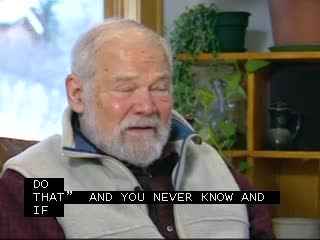 Episode 10: Jay Hammond (part 2)
Episode 10: Jay Hammond (part 2)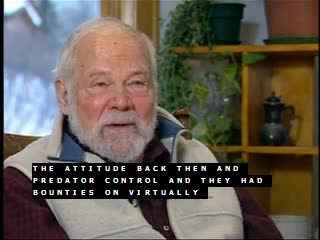 Episode 9: Jay Hammond (part 1)
Episode 9: Jay Hammond (part 1)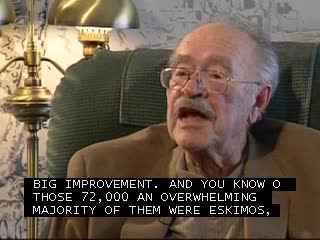 Episode 8: George Sundborg
Episode 8: George Sundborg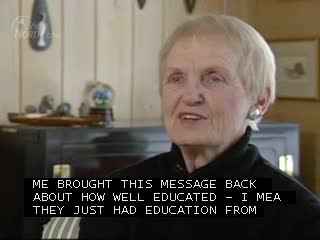 Episode 7: Katie Hurley
Episode 7: Katie Hurley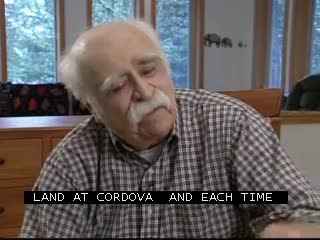 Episode 6: George Rogers
Episode 6: George Rogers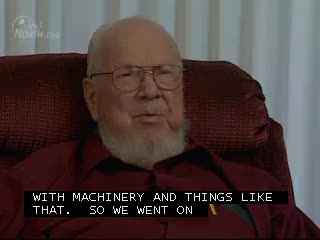 Episode 5: Maynard Londborg
Episode 5: Maynard Londborg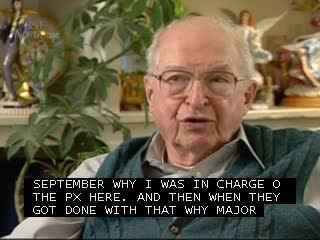 Episode 4: Jack Coghill
Episode 4: Jack Coghill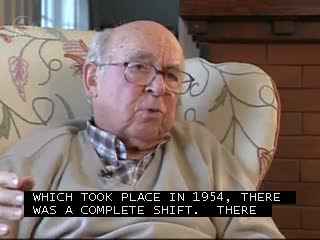 Episode 3: Tom Stewart
Episode 3: Tom Stewart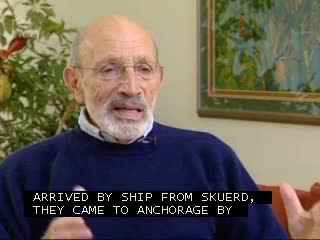 Episode 2: Vic Fischer
Episode 2: Vic Fischer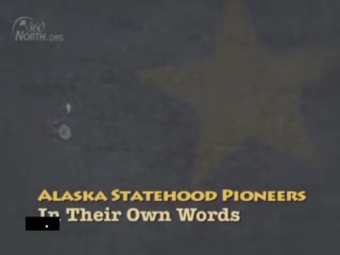 Episode 1: The Constitutional Convention and Statehood
Episode 1: The Constitutional Convention and Statehood